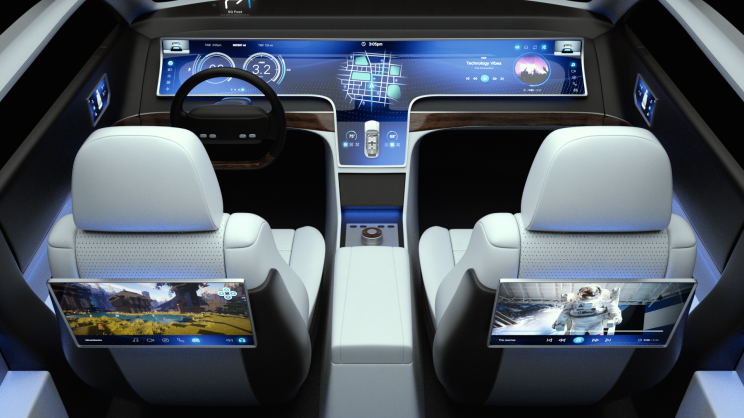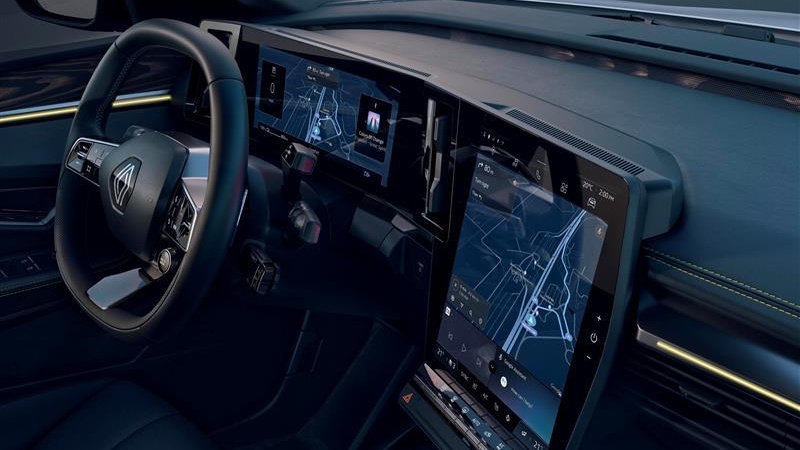Qualcomm partners with Volvo, Honda and Renault in fresh automotive push
Snapdragon is coming to future EVs

Mobile chip maker Qualcomm has lifted the lid on its plans to provide hardware and software for future Volvo, Honda and Renault models at CES 2022.
The US-based company, which also confirmed it would be developing chips for BMW's self-driving cars towards the end of 2021, took to the trade show floor in Las Vegas to discuss the suite of infotainment and assistance tools now available to the above automakers.
Those tools, dubbed collectively as the Qualcomm Digital Chassis, include Snapdragon Ride, Snapdragon Cockpit, Snapdragon Auto Connectivity and Snapdragon Car-to-Cloud Services.
Each covers a different technological area – be it driving assistance or multimedia – and the partnered car brands can choose to implement these features collectively or in isolation.
Volvo, for instance, will implement Qualcomm's Snapdragon Cockpit – software for powering multiple displays and immersive audio systems – in its upcoming fleet of electric cars, including those under the Polestar banner.
That means vehicles like the Polestar 3 SUV and the Swedish automaker's soon-to-be-released fully electric SUV will boast infotainment systems that are "twice as fast" as their predecessors, with their ability to generate graphics "up to 10 times faster."
Honda will likewise utilize Qualcomm's advanced infotainment technology in cars coming to the US in the second half of 2022, and globally in early 2023. Upcoming models will benefit from improved AI experiences and in-cabin capabilities like blind spot reduction aids, assisted braking notifications and signals for approaching emergency vehicles.
Get daily insight, inspiration and deals in your inbox
Sign up for breaking news, reviews, opinion, top tech deals, and more.
The Renault Group, meanwhile, will work with Qualcomm to leverage a more inclusive adoption of all the tools available as part of the Snapdragon Digital Chassis.

The implementation of Snapdragon Auto Connectivity, for example, will mean upcoming Renault models are likely to feature market-leading LTE, 5G, Wi-Fi and GPS systems (read: top-of-the-range sat navs).
We already knew Qualcomm and Google have joined hands to supply a key computing chip for the digital dashboard of the next-generation Renault Megane E-TECH, with the in-development Renault 5 EV likely to benefit from the partnership, too.
The future is automated
Perhaps the most interesting tool in the Qualcomm Digital Chassis, though, is the Snapdragon Ride system.
After Qualcomm's $4.5 billion purchase of automotive technology firm Veoneer last year, the Snapdragon Ride suite now includes a new chip for computer vision which, the company says, is capable of tapping into a car's set of cameras to vastly improve safety features like automatic lane control.
Models developed by automakers making use of this particular tool will also benefit from improved map crowd-sourcing, driver monitoring systems (DMS), parking systems and cellular vehicle-to-everything (C-V2X) technologies.
There's every chance, then, that the first commercially-viable self-driving car could wear a Volvo, Honda, Renault or BMW badge.
In any case, CES 2022 has proven to be a promising showcase for a number of emerging automotive technologies – did you know Sony is building an electric car? – and we're excited to see how the industry develops further in the years to come.
- Check out all of TechRadar's CES 2022 coverage. We're bringing you all the breaking tech news and launches, everything from 8K TVs and foldable displays to new phones, laptops and smart home gadgets.

Axel is TechRadar's UK-based Phones Editor, reporting on everything from the latest Apple developments to newest AI breakthroughs as part of the site's Mobile Computing vertical. Having previously written for publications including Esquire and FourFourTwo, Axel is well-versed in the applications of technology beyond the desktop, and his coverage extends from general reporting and analysis to in-depth interviews and opinion. Axel studied for a degree in English Literature at the University of Warwick before joining TechRadar in 2020, where he then earned an NCTJ qualification as part of the company’s inaugural digital training scheme.